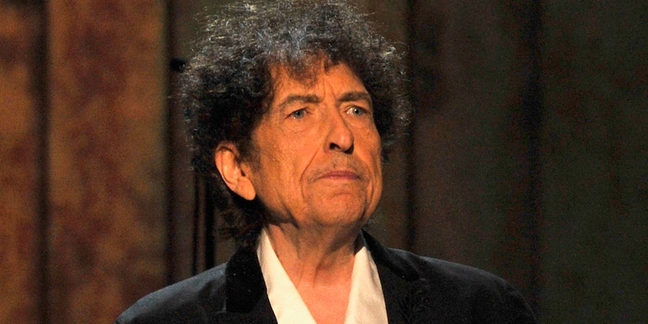
Bob Dylan on Nobel Prize Win: “Something I Never Could Have Imagined”

Bob Dylan was absent for the 2016 Nobel Prize Award Ceremony, where he was awarded the Nobel Prize in Literature and honored by a performance from Patti Smith. Shortly after the ceremony was the Nobel Banquet, which is where the Nobel Laureates deliver speeches acknowledging and accepting their awards. Dylan provided a speech, and in his absence, it was delivered by United States Ambassador to Sweden Azita Raji. Read the full speech here.
In the speech, he wrote that the prize “is something I never could have imagined or seen coming.” He continued: “If someone had ever told me that I had the slightest chance of winning the Nobel Prize, I would have to think that I’d have about the same odds as standing on the moon,” he wrote. Elsewhere, he discusses the moment when he found out that he’d won the Nobel Prize:
I was out on the road when I received this surprising news, and it took me more than a few minutes to properly process it. I began to think about William Shakespeare, the great literary figure. I would reckon he thought of himself as a dramatist. The thought that he was writing literature couldn’t have entered his head. His words were written for the stage. Meant to be spoken not read. When he was writing Hamlet, I’m sure he was thinking about a lot of different things: “Who’re the right actors for these roles?” “How should this be staged?” “Do I really want to set this in Denmark?” His creative vision and ambitions were no doubt at the forefront of his mind, but there were also more mundane matters to consider and deal with. “Is the financing in place?” “Are there enough good seats for my patrons?” “Where am I going to get a human skull?” I would bet that the farthest thing from Shakespeare’s mind was the question “Is this literature?”
The end of the speech circles back:
But, like Shakespeare, I too am often occupied with the pursuit of my creative endeavors and dealing with all aspects of life’s mundane matters. “Who are the best musicians for these songs?” “Am I recording in the right studio?” “Is this song in the right key?” Some things never change, even in 400 years.
Not once have I ever had the time to ask myself, “Are my songs literature?”
So, I do thank the Swedish Academy, both for taking the time to consider that very question, and, ultimately, for providing such a wonderful answer.













Recent Comments